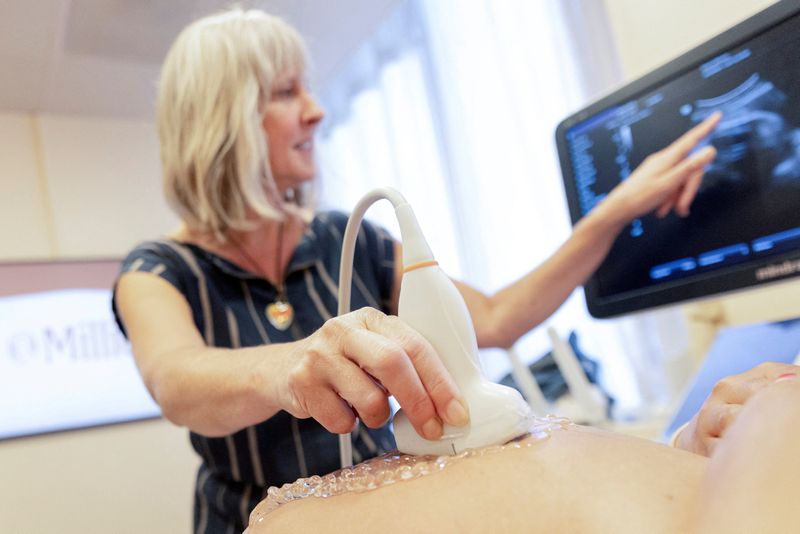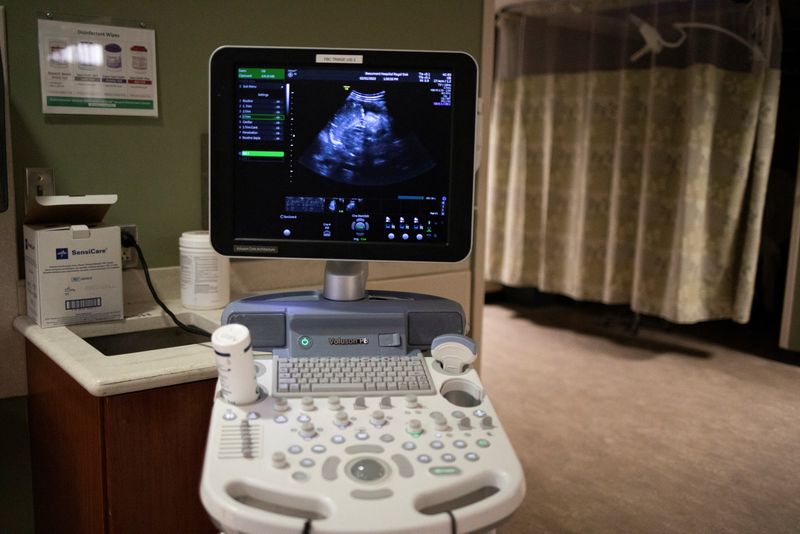By Amina Niasse
NEW YORK (Reuters) - After working as a doula for 10 years, Kortny Feutardo took her first Maryland Medicaid patient in January, providing the new mom with care coordination and counseling.
Feutardo is one of many providers benefiting from growing investment in the maternal and neonatal health sector. After not receiving timely payments from her patient's managed care organization, she began working with Mae, a venture capital-backed company that pairs pregnant women with doulas through Medicaid partnerships and handles payment.
With a U.S. maternal mortality crisis underway, government health plans for low-income Americans in the past few years have increased coverage of services shown to improve the health of mothers and babies.
And now, venture capital firms, including Khosla Ventures and Rock Health, are bolstering investment into maternal health companies and technology, as they anticipate sector growth and bet payment rates from both Medicaid and commercial insurance will accelerate.
Early maternal healthcare investments in businesses like Mae and others ranging from clinics to specialists in fertility and nutrition counseling totaled $306.5 million in 2023, a 700% increase from $38.1 million in 2018, according to data that research firm Pitchbook prepared for Reuters.
SAVING LIVES
Midwife and doula-led births often provide perinatal care coordination, post-partum and pre-natal counseling, lactation counseling, behavioral health screenings and support for moms quitting smoking. Midwives are clinical providers certified to provide obstetric and gynecological care. While doulas don't provide clinical services, they assist patients through educational and emotional support.
Increasing insurance coverage and integration of doulas and midwives by healthcare plans, along with promising financial exits are encouraging more investment. Alice Zheng, a partner at VC firm RH (NYSE:RH) Capital, pointed to Amazon (NASDAQ:AMZN)'s recent acquisition of membership-based clinic One Medical as a sign of potential for maternal health clinics.
"There have been some great exits in clinical care recently," said Zheng, whose firm invested in maternity-clinic Millie.
Millie Clinic, based in Berkeley, California closed its very first round of funding in 2022 with $4 million, led by BBG Ventures, which invests in female and diverse-led companies, and TMV.
At Khosla Ventures, investors target maternal health technologies, a strategy they say has advantages over clinical care companies. The firm, with assets of $17 billion, has invested in Mirvie, which uses RNA testing to predict pregnancy complications and preterm infant incubator Vitara.
"Saving the lives of mothers and babies is in everyone's interest, so for breakthrough innovations like Mirvie and Vitara, there is a lot of space to obtain reimbursement," said Alex Morgan, a partner at Khosla Ventures.
U.S. maternal mortality rates are far worse than any other high-income nation and for Black women, those rates are more than twice as high, according to a 2024 Commonwealth Fund report.
Midwife-led care has been shown to help improve health outcomes for Black women and their babies. A U.S. government analysis of birth center outcomes between 2013 to 2017 found that Black women who gave birth in midwife-led birthing centers had lower rates of pre-term and low-weight births.
In 2020, healthcare VC firm Rock Health Capital invested in Oula, which operates two maternity centers in New York that offer patients both midwifery-led care and obstetrics in two locations. Oula closed its second round of funding in February with $28 million and is opening a third Manhattan clinic by September.
Bill Evans, founder of Rock Health Capital, said he was driven to invest in Oula by its health outcomes. Oula, when compared with the National Center for Health Statistics' New York City natality data had a 61% lower preterm birth rate across 1,500 births since 2021, the company said.
Millie's cohort of 150 births experienced a 71.3% lower preterm birth rate than the national rate calculated by the U.S. Centers for Disease Control. And for Black mothers, who are more likely to deliver their babies prematurely, the preterm birth rate was 60.2% lower, the company said.
REIMBURSEMENT ISSUES
Medicaid coverage for doula services is not currently a federal requirement, but states can choose to cover doulas within their Medicaid plans, said Amy Chen at the National Health Law Program. Medicaid plans covered 41% of U.S. births in 2022, according to the Centers for Disease Control and Prevention.
A Centers for Medicare and Medicaid Services spokesperson said that the agency encourages states to provide coverage.
Fifteen states and Washington D.C. are reimbursing doulas, including three that added it to Medicaid just this year, according to the National Health Law Program.
Commercial insurance mandates are further behind with only Rhode Island requiring it.
The three largest U.S. managed care companies Cigna (NYSE:CI), CVS's Aetna and UnitedHealth (NYSE:UNH) leave the decision to cover doulas to health plan sponsors like employers or Medicaid, according to their websites. CVS and UnitedHealth confirmed their policies. Cigna did not respond to a request for comment.
As doula and midwifery companies try to expand nationally, some grapple with insufficient reimbursement.
"We have to solve for inadequate reimbursement rates, viable health system partners, and availability of clinical talent in those markets," said Anu Sharma, chief executive officer at Millie.
The reimbursement landscape makes venture funding a necessity as companies look to grow.
Venture funding can help sustain innovation as Medicaid-focused businesses face reimbursement limitations, said Maya Hardigan, founder and CEO of Mae.
Even in New York, which pays midwives the highest rate of reimbursement in the country - 95% of an obstetrician's fee - and up to $1,440, payment is not enough, companies said.
Doula Feutardo has been glad to help a more diverse group in Medicaid, but said that reimbursement has been an issue.

Feutardo who travels across Washington, Maryland, and Virginia for clients, says government-sponsored reimbursement could be raised to cover travel, food and housing costs. She has now lowered private fees to match her Maryland Medicaid rate of $1,300 per delivery.
"I give equal love to moms," she said.
